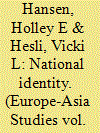| Srl | Item |
| 1 |
ID:
080980


|
|
|
|
|
| Publication |
2008.
|
| Summary/Abstract |
Regional and global intergovernmental organizations have grown both in number and scope, yet their role and effectiveness as conflict managers is not fully understood. Previous research efforts tend to categorize organizations solely by the scope of their membership, which obscures important sources of variation in institutional design at both the regional and global levels. International organizations will be more successful conflict managers if they are highly institutionalized, if they have members with homogeneous preferences, and if they have more established democratic members. These hypotheses are evaluated with data on territorial (1816-2001), maritime (1900-2001), and river (1900-2001) claims from the Issue Correlates of War (ICOW) project in the Western Hemisphere, Europe, and the Middle East. Empirical analysis suggests that international organizations are more likely to help disputing parties reach an agreement if they have more democratic members, if they are highly institutionalized, and when they use binding management techniques
|
|
|
|
|
|
|
|
|
|
|
|
|
|
|
|
| 2 |
ID:
086232


|
|
|
|
|
| Publication |
2009.
|
| Summary/Abstract |
We challenge the civic-ethnic dichotomy drawn by previous authors and propose a four-category typology of identities based on out-group tolerance and in-group attachment. Drawing from work on national identity formation and nation-building, we test hypotheses about the processes that cause individuals to adopt one identity over others using survey data based on representative samples of five ethnic groups in Ukraine. We find that the effects of socialisation processes vary greatly depending upon ethnic group. Our results challenge some long-held assumptions about the potential destabilising effects of 'ethnic' identities and the degree to which 'civic' identities correspond to values and behaviours supportive of democracy.
|
|
|
|
|
|
|
|
|
|
|
|
|
|
|
|